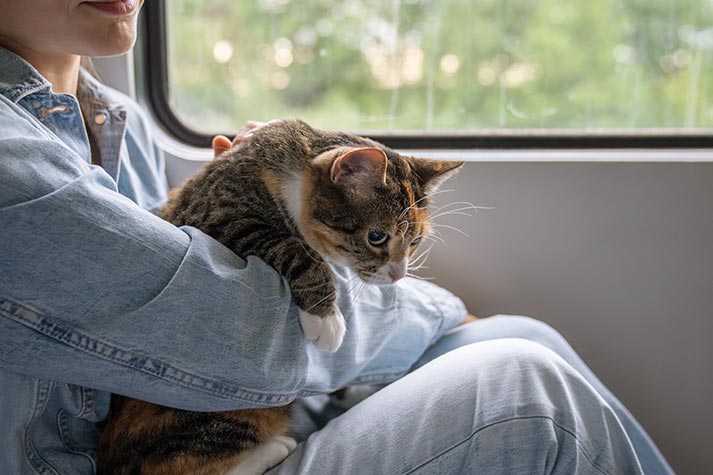
23 Oct
Everything You Need to Know About Rabies Vaccinations & Titer Tests for Pet Travel
Rabies is a dangerous viral disease. It is zoonotic, meaning it spreads from animals to humans through direct or indirect contact. Given the danger posed by rabies, countries around the globe have tried their best to eradicate the disease from their shores. While these efforts have led to the eradication of rabies in some countries, rabies is still an issue in many countries where it causes thousands of fatalities yearly.
To prevent the spread of rabies, the rabies vaccination is administered to dogs and cats. Provided the vaccination is kept up-to-date, they will be protected from rabies and will not pass it on to any people. Rabies vaccines come in two forms, one that protects for 1 year and one that protects for 3 years, with both of them needing to be kept up-to-date to maintain protection. Given that rabies is a dangerous viral infection, rabies vaccination is an important part of pet transportation, especially an international pet relocation, with most countries requiring proof of vaccination against the disease.
What is the Rabies Virus?
Rabies is a viral infection that targets the nervous system. It is a zoonotic disease, meaning it spreads from animals to humans. The rabies virus is dangerous because it results in fatality once symptoms appear; to this day, there have been a handful of documented cases of rabies being cured after the appearance of symptoms.
While rabies is a scary and threatening disease, it can be controlled thanks to vaccinations. The disease can be prevented if you visit a doctor or hospital immediately after you’ve been bitten. Rabies spreads through animal saliva. Being bitten, scratched, or licked by an animal with rabies can pass it on to you, especially if the bite/scratch breaks the skin and draws blood.
Once the virus enters the bloodstream, it travels to the brain, leading to the famous symptoms of the disease. Rabies is not fatal instantly, as it takes time to reach the brain, but once there are visible symptoms, there is nothing one can do to prevent fatality.
Here are a few symptoms of the disease to keep an eye on:
- Aggression
- Restlessness
- Excessive Salivation
- Hydrophobia
- Paralysis
- Seizures
- Inability to swallow (especially liquids)
How Can We Prevent Rabies?
Since rabies is incurable once the symptoms are visible, it is important to take preventive action to reduce the spread of this viral disease. Timely vaccinations are the easiest way to prevent rabies in humans and animals.
Here are a few things you can do to prevent the spread of rabies:
- Vaccinate Your Pet: Your pets must always be vaccinated, and their vaccination should be up-to-date. Regardless of whether your pet is an indoor or outdoor pet, you should get them vaccinated. This is a basic requirement for pet registration in many countries as well, so make sure your pet's vaccination is up to date and re-applied promptly.
- Avoid Wildlife: Wild animals are known to carry and transmit the rabies virus. Since it is difficult to say which stray animal has rabies without testing, they should be avoided. If you are outdoors with your pet a lot, make sure to keep them away from other animals, even though wanting to explore is an instinct. The fewer interactions between you/your pet and wild animals, the lower the chance of catching a disease like rabies.
- Report Wild Animal Incidents: If your pet or another person’s pet has been bitten by a stray animal, head to your vet immediately. even if your pet is vaccinated, you never know what sorts of infections a stray animal may carry, hence it is best to visit your vet and get your pet the care it requires.
Rabies Neutralizing Antibody Titer Test (RNAT)
A rabies titer test, alternatively known as a rabies neutralizing antibody test is, a test used to measure vaccine effectiveness. Once your pet is vaccinated against rabies, you must wait for at least 30 days before drawing a blood sample from them to be sent for testing. The sample is drawn by an accredited veterinarian and then sent to an appropriate blood-testing lab.
The test uses a small blood sample from your pet, diluted to measure antibody levels. The resulting ratio shows how many times the sample can be diluted until no antibodies are present. While titer tests have various purposes, a rabies titer test for pets gauges their rabies antibody levels.
This helps assess if the pet has enough antibodies to prevent future infections. A successful vaccination yields a ratio of at least 0.5 IU/ml, ensuring protection against rabies. Remember to titer test your pet 30 days post-rabies shot and wait 3 months before international transport. Titer tests are crucial for frequent travellers, pets with unknown vaccination histories, or elderly/ill pets.
Rabies Titer Test for International Pet Travel
A rabies vaccine is an essential requirement for international pet travel. Since no country wants its ecosystem to be infected by diseases from animals that are being imported, you should always vaccinate your pet before travelling.
A rabies titer test is sometimes required to ensure your pet has been vaccinated against rabies and has the necessary level of protection to prevent re-infection. Rabies titer tests are conducted by blood testing labs. The process of sample extraction, submission, testing, and results can take some time, so make sure to get this done well before your planned date of travel.
Things to Remember Before a Titer Test:
- Make sure your pet is microchipped before, or at the same time as their rabies vaccination.
- Make sure to account for the time it will take for a result to arrive, as waiting times during periods of high demand can extend your wait.
- Ask your vet to provide you with the official results, and not just the digital copy of one. If you’ve hired a pet relocation company, they will do this for you.






AUTHOR’S BIO
Carry My Pet
Passionate pet enthusiasts and globetrotters, dedicated to easing furry friends' journeys worldwide. Penning tales of compassion at CarryMyPet, where every relocation is a tail-wagging adventure.